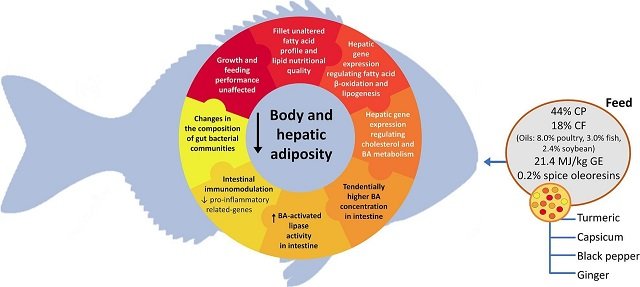
Globalization and the intensification of the aquaculture sector urgently demand a reduction in the use of fish oil in feeds. This has compelled the aquafeed industry to seek economically viable and environmentally sustainable ingredients.
However, the reduction of fish oil content in aquafeeds raises concerns about the physiological and immunological well-being of cultured fish, linked to low levels of long-chain polyunsaturated fatty acids (LC-PUFAs) and increased levels of n-6 PUFAs.
An article published in the scientific journal Aquaculture by researchers from the Institut de Recerca i Tecnologia Agroalimentàries (IRTA), the Institute of Aquaculture Torre de la Sal, and Lucta S.A. explores an innovative study investigating the potential benefits of supplementing aquafeeds with spice oleoresins (SO) to counteract the negative effects of low fish oil content.
The study centers on the essential role of long-chain polyunsaturated fatty acids n-3 (n-3 LC-PUFA) and potential disorders associated with their decrease in aquafeeds. Inspired by mammalian literature, researchers hypothesize that spice oleoresins, including turmeric, capsicum, black pepper, and ginger, could mitigate these adverse effects.
Methodology
The experiment involves gilthead seabream (Sparus aurata), a commonly cultivated species, fed with a diet containing low fish oil (3%) and poultry fat as the primary oil source. The diet is supplemented with encapsulated SO at 0.2%.
After a 90-day trial period, researchers assess various parameters, including lipid accumulation, liver and intestine histology, bile salt-activated lipase activity, and gene expression related to lipid metabolism.
Key Results
The study results indicate that supplementing with turmeric, capsicum, black pepper, and ginger oleoresins at the tested dietary inclusion level did not compromise somatic growth or overall body condition of gilthead seabream. Other notable results include:
- Fish fed the SO diet showed lower perivisceral and hepatic fat levels.
- Histological analysis revealed a reduction in lipid deposits in the liver and intestine.
- Increased activity of bile salt-activated lipase in the anterior intestine.
- Regulation of gene expression related to lipid metabolism, suggesting improved homeostasis.
- Immunomodulatory effects, with down-regulation of pro-inflammatory cytokines in the intestine, indicating a potential anti-inflammatory response.
- No significant impact on fish growth, feed performance, or oxidative status, except for subtle indications of reduced hepatic ROS levels.
Microbial Community Evaluation
Analysis of intestinal microbial communities showed no significant differences in alpha and beta diversity between experimental diets. However, there was an increase in the relative abundance of specific bacterial groups in the intestines: Bacteroides, Desulfovibrio, Candidatus Arthromitus, and Ralstonia.
Conclusion
The study concludes that supplementing aquafeeds with the tested combination of spice oleoresins could be an effective strategy to prevent lipid accumulation and inflammation in fish fed diets with reduced fish oil levels.
“In general, the results presented in this document indicate comparable effects of spices on fish and mammals, with similar beneficial impacts on energy expenditure, fat homeostasis, reduction of body adiposity, and improvement in intestinal immune status, through multiple mechanisms,” conclude the researchers.
These findings open new avenues for the aquaculture industry to enhance fish health and lipid metabolism while addressing challenges associated with sustainable feed formulations.
The study has been funded by the Ministry of Science and Innovation of Spain.
Contact
Alberto Ruiz
Aquaculture Program
Institut de Recerca i Tecnologia Agroalimentàries (IRTA)
Centre de La Ràpita, La Ràpita, Spain
Email: alberto.ruiz@irta.cat
Reference
Alberto Ruiz, Ignasi Sanahuja, Karl B. Andree, Dolors Furones, Paul G. Holhorea, Josep A. Calduch-Giner, Jose J. Pastor, Marc Viñas, Jaume Pérez-Sánchez, Sofia Morais, Enric Gisbert. 2023. Supplementation of gilthead seabream (Sparus aurata) diets with spices as a functional strategy to control excess adiposity through lipid, cholesterol and bile acid metabolism, and to induce an immunomodulatory intestinal regulation. Aquaculture, 2023, 740378, ISSN 0044-8486, https://doi.org/10.1016/j.aquaculture.2023.740378.

